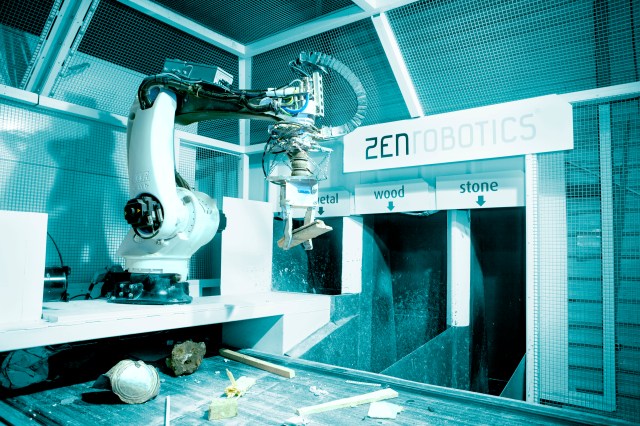Over the last few years tech companies both large and small have developed programs that can “dream”; and understand and process information; and even write articles; but nothing has come close to the holy grail of artificial intelligence — developing software that can learn independently.
At least, not until now.
Helsinki might seem like an unlikely potential birthplace for this new era of intelligent machines. Yet it’s there — on a side street blocks from the central train station — that a team of roboticists, neuroscientists, and graphics programmers planted the seed that would become the new artificial intelligence software developer, The Curious AI Company.
Unlike other technologies that are training computers to understand the information they’re receiving, the Curious AI programmers are actually attempting to give computers a way to learn in an unsupervised manner — a process that mimics human cognition more closely, according to company co-founder Harri Valpola.
“The future of artificial intelligence is in machine learning and in how our brain works,” says Valpola. “[So far] the successful stories have been about supervised deep learning. But it only works if you have huge amounts of labeled data. It’s not machines learning by themselves, it’s people training them. [But] the way our brain learns is more through unsupervised learning.”
Valpola began working at the intersection of neuroscience, machine learning and robotics over twenty years ago as a research assistant in the lab of Teuvo Kohonen, a pioneer of neural networks in 1993.
“I’ve been doing neural networks, machine learning, and building brains ever since,” Valpola says.
After nearly a decade researching neural networks, Valpola took the next step on the road that would lead him to launch Curious with his co-founders: Mathias Berglund, Timo Haanpää, Tapani Raiko, Antti Rasmus. He turned to robotics.
That meant a trip to Zurich and still more research under the tutelage of Rolf Pfeifer at his robotics laboratory, before returning to Helsinki and launching Valpola’s own robotics lab to incorporate the work he’d done with both machine learning and AI and robotics into a single system.
Valpola believes that — just like humans — machines can learn by doing, and by doing things in an unsupervised manner. It’s the thesis behind ZenRobotics, an automating waste recycling company and the first venture Curious AI undertook.
“We were building brains for robotics and at some point we decided that we knew enough and had developed enough technologies with processors and controllers,” Valpola says. “We decided to start commercializing that, and that’s why we started Zen Robotics.”

Although Curious AI is starting with semi-autonomous robots that are sorting valuable material from trash in waste processing facilities, it’s a harbinger for a more fully roboticized future, in Valpola’s vision.
Indeed, the applications extend far beyond sorting trash. One of the big problems with autonomous vehicles is getting programs to understand segmentation — or identifying and classifying objects in a group without having to label each different object — which Valpola says is where current technologies have stalled.
“Computer vision is still struggling with segmentation and I think it’s because people are trying to solve it the wrong way,” says Valpola. “It’s integrated with the rest of the deep learning machinery and we believe we can make a breakthrough there. Currently, in computer vision, segmentation is a big bottleneck.”
But using ZenRobotics as an example, Curious’ team of founders can already point to a real example where their technology appears to have solved the problem.
The technology was persuasive enough to line up an EUR800,000 ($1 million) seed investment for Curious AI from ZenRobotics backers Invus and LifeLine Ventures and newcomer Balderton Capital (which will rarely take a bet so early in a company’s development).
There will be many new startups that are taking up the opportunity of doing things in different ways once the machine intelligence is more than it is now. Computers are still damn stupid in the end. Harri Valpola
Using that funding, Curious AI intends to sell its artifical intelligence software as a toolkit that can be applied at companies like Google, Facebook, Nvidia, or IBM — each of whom have their own deep learning and artificial intelligence programs.
“These companies can take these algorithms and create new things with them,” says Valpola. “We are planning to demonstrate our technology in real time vision systems. That’s the first milestone. Build a real time vision system that can be trained in a semi-supervised manner rather than label every frame.”
But how does even developing real-time vision systems get computers to the point of cognition? The secret, says Valpola, is in refining the unsupervised learning systems of the programs.
“The artificial intelligence itself will develop new artificial intelligences,” he says. “We need to bootstrap that to get to the point where the artificial intelligence is at least as intelligent as us.”
And it will require more work from an entire ecosystem of startup companies to make the singularity happen sooner rather than later.
“There will be many new startups that are taking up the opportunity of doing things in different ways once the machine intelligence is more than it is now,” says Valpola. “Computers are still damn stupid in the end.”































Comment